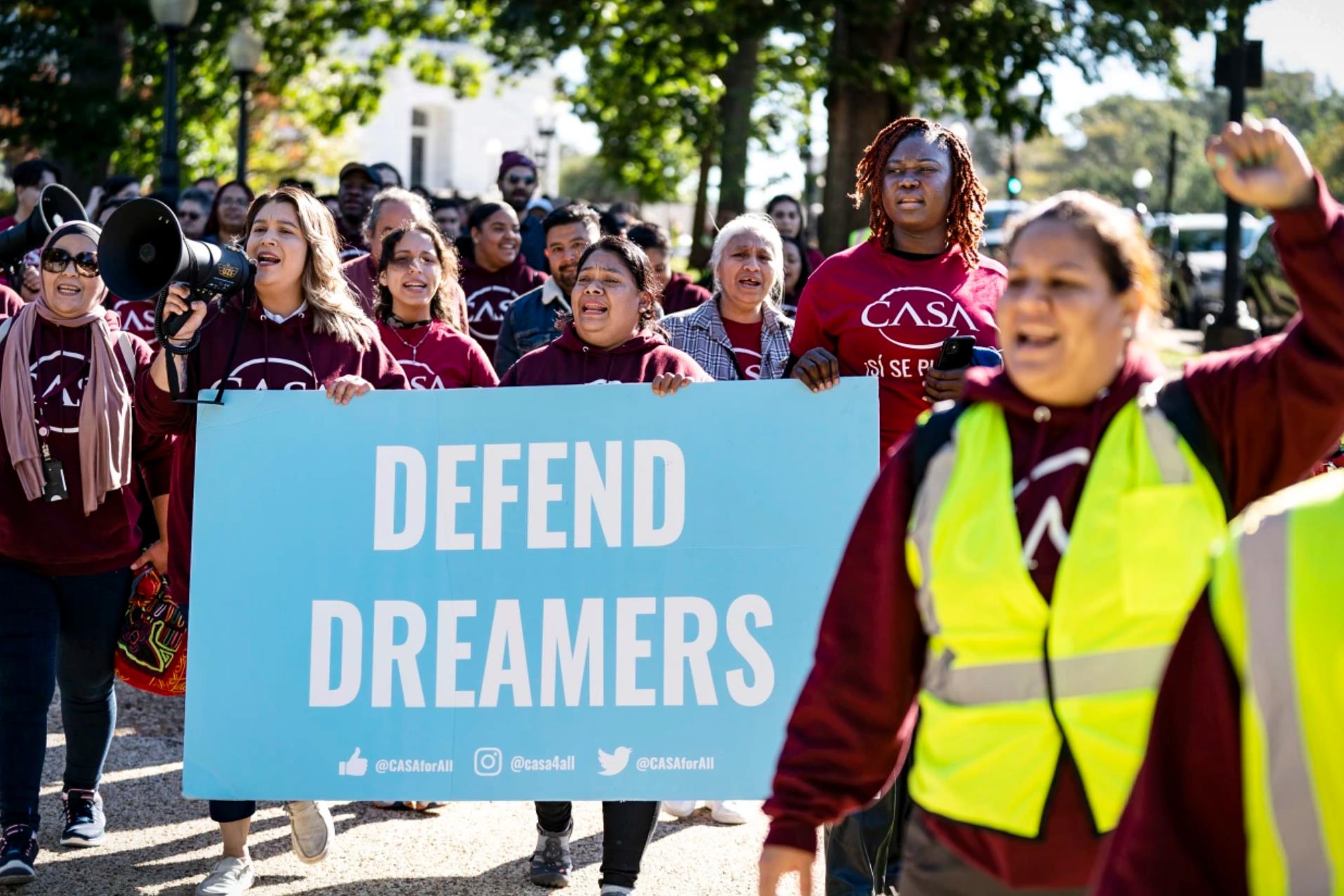In addition to lacking health insurance, DACA recipients cited fears around costs and immigration status as barriers, a report first shared with NBC News found.
More than a quarter of young immigrants protected by the Deferred Action for Childhood Arrivals program lack health insurance and face burdens preventing them from accessing care, according to new data first shared with NBC News.
A report published Friday by the immigrant rights nonprofit group National Immigration Law Center, documenting the findings of a recent survey, finds that 27% of DACA recipients reported not being covered by any kind of health insurance or other health care plan.
The results suggest that of the more than 580,000 young adults without legal status who are allowed to work and study without fear of deportation under the Obama-era DACA program, almost 157,000 are estimated to be uninsured.
The survey was conducted last year with 817 DACA recipients. It was administered by Tom K. Wong, founding director of the U.S. Immigration Policy Center at the University of California, San Diego, with the help of United We Dream, the nation’s largest immigrant youth-led organization, the Center for American Progress policy institute and the National Immigration Law Center.
A previous version of the survey conducted in 2021 found the DACA uninsured rate to be at 34%. Kica Matos, president of the National Immigration Law Center, attributed the slight dip to “a healthier economic climate.”
“The last survey was done when we were still in the middle of the pandemic, so we believe that economic trends have since improved … This likely means there are more DACA recipients that are employed and therefore have access to health care” through their employers, she said.
Of the DACA recipients who reported having health insurance, 80% said they were covered through an employer or union.
But unlike most in America, if DACA recipients lose their job and with that their health insurance, they can’t fall back on federal health insurance programs, which are often more affordable but are only available to those with legal immigration status.
Because being ineligible for federal health insurance contributes to DACA recipients’ high uninsurance rate, the Department of Health and Human Services under President Joe Biden proposed a rule that would expand access to health care coverage to them. Research has found that DACA recipients contributed an estimated $6.2 billion in federal taxes every year that help fund such programs.
The Biden proposal calls for the definition of “lawful presence” to be amended to include DACA recipients for purposes of Medicaid and Affordable Care Act coverage.
“It brings up a lot of hope for many of us to be able to have affordable health care access because a lot of the times we avoid going to a doctor,” DACA recipient Diana Avila said. “The thought of how much is it going to cost is what drives a lot of us to not want to go to the doctor.”
The proposed Biden rule hasn’t yet been finalized, meaning that DACA recipients’ access to federal health insurance programs is not yet a done deal.
In response to an email from NBC News, the Centers for Medicare and Medicaid Services, which submitted the proposed rule, stated that, “While we cannot speculate on when the rule will be finalized, note that the proposed rule includes a proposed effective date for all provisions of November 1, 2023.”
The CMS will be requesting comment from the public until June 23 on the proposed regulations, “and specifically on the feasibility of this date and whether to consider a different effective date,” it stated.
Avila, 22, was born in Honduras and has lived in Indiana since she was a 4-year-old, and was 12 when she got DACA in 2012.
Obstacles to health care access
DACA recipients are awaiting the fate of the proposed rule at a time when they are three times more likely to be uninsured than the general population, according to last year’s survey.
DACA has helped many eligible young immigrants access better paying jobs and educational opportunities, but that hasn’t been the case for all recipients.
“There are still significant disparities in terms of access to health care for this particular population,” Matos said.
According to the survey, DACA recipients reported other barriers to accessing health care:
57% of respondents believed they were ineligible to access care due to their immigration status.
51% reported not being aware of any affordable care or coverage options available to them.
21% believed that accessing health care services could negatively affect their immigration status or that of a family member.
Of those surveyed, 71% reported past situations in which they were unable to pay medical bills or expenses.
On top of that, “there are also those memories of families not being able to afford health care and having to deal with bills,” Matos added.
Avila remembers growing up in a mixed immigration status family. That meant she and her oldest sibling couldn’t access affordable health care while her younger siblings, who were born in the U.S., qualified for care.
As a child, Avila was prone to ear infections, she said. Her mother would use every home remedy possible to evade doctors and hospitals and avoid unaffordable medical costs. In contrast, her younger brothers would go to the doctor more often, even for the most minor of issues.
When Avila was 18, she suffered a concussion while playing soccer at school and needed to visit a specialist. She recalled hesitating to go because she was worried about her and her family’s ability to afford the care.
“It’s sad to think about that. I considered not getting looked at, taken care of, because of how much it was going to cost,” she said.
DACA’s uncertainty — and the mental health toll
While DACA has been around for a decade, it’s faced legal challenges from the Trump administration and Republican-led states. The program has been closed to new registrants since July 2021 while a lawsuit filed by Texas and other GOP-led states makes its way through the courts.
To improve the chances that DACA will survive legal battles, the Biden administration implemented a rule in October that turned the program into a federal regulation. A federal judge in Texas is expected to rule on the legality of the new rule this year.
“The precarious nature of DACA has brought with it feelings of anxiety, depression and fear related to the future of their status because it’s so uncertain,” Matos said of DACA recipients.
The new report found that almost half (48%) of DACA recipients who reported experiencing mental or behavioral health issues did not seek care from a mental health professional. The three main barriers were expensive costs, lack of time and limited access to providers able to meet their cultural or language needs.
Avila recently graduated from Marian University in Indianapolis with a degree in psychology and works at a nonprofit organization that serves immigrants.
Despite the uncertainty surrounding DACA, she plans to apply to law school and specialize in immigration law and human rights, hoping that a more permanent solution to her immigration status emerges.
“DACA recipients contribute so much to society that it’s time for change,” Avila said. “A pathway to citizenship would be the best way to appreciate the work that DACA recipients have been doing since they came to the U.S.”




